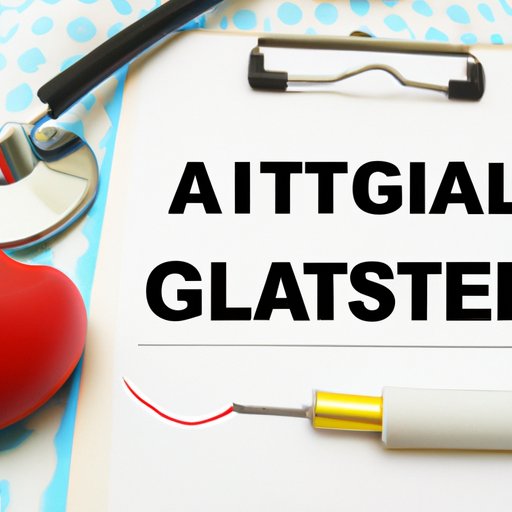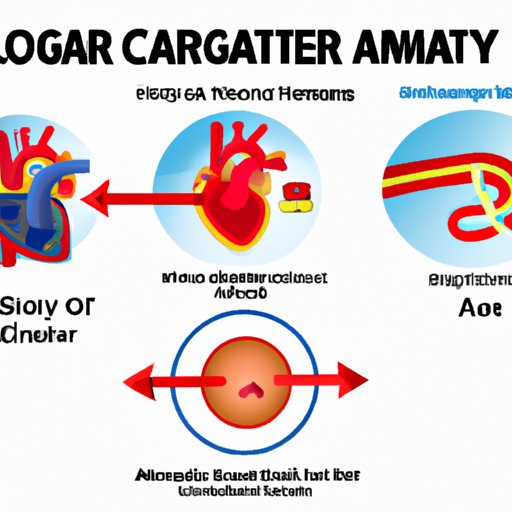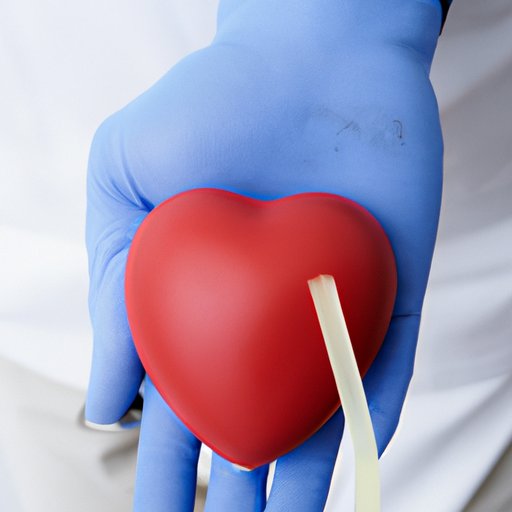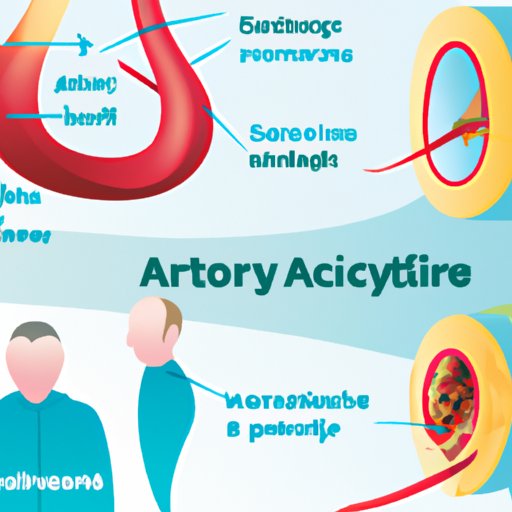Introduction
Clogged arteries, also known as atherosclerosis, are a condition in which fatty deposits build up in the walls of your arteries, leading to a blockage. This blockage restricts blood flow to and from the heart, potentially leading to serious health problems such as heart attack or stroke. Knowing the signs and symptoms of clogged arteries is key to recognizing the problem and seeking treatment.
Examining Your Risk Factors
Certain factors can increase your risk of developing clogged arteries. These include:
High Cholesterol Levels
High cholesterol levels, especially LDL (“bad”) cholesterol, can cause fatty deposits to form in your arteries and lead to blockages. Your doctor can perform a simple blood test to determine your cholesterol levels and recommend lifestyle changes or medications if necessary.
High Blood Pressure
High blood pressure can damage the walls of your arteries over time, causing them to become narrow and harden. This reduces blood flow and increases the risk of clogged arteries. Your doctor can check your blood pressure during routine appointments.
Diabetes
Diabetes can damage the walls of your arteries, leading to a buildup of fatty deposits. People with diabetes should have their blood sugar levels regularly monitored by their doctor.
Smoking
Smoking can damage the walls of your arteries, leading to an increased risk of clogged arteries. Quitting smoking can reduce this risk significantly.
Family History
If you have a family history of cardiovascular disease, you may be at a higher risk of developing clogged arteries. Talk to your doctor about ways to reduce your risk.
Knowing the Signs and Symptoms
Clogged arteries can cause a variety of symptoms, including:
Chest Pain or Tightness
If your arteries are clogged, you may experience chest pain or tightness. This pain may be felt in your chest, neck, jaw, arms, or back. It may come and go or be constant. Seek medical attention if you experience chest pain.
Shortness of Breath
Clogged arteries can restrict your breathing, making it difficult to take a deep breath. If you experience shortness of breath, seek medical attention.
Fatigue
Clogged arteries can reduce the amount of oxygen that reaches your muscles, leading to fatigue. If you are feeling unusually tired, talk to your doctor.
Dizziness
Clogged arteries can reduce the amount of oxygen that reaches your brain, leading to dizziness. If you experience dizziness, seek medical attention.
Unexplained Weight Loss
Unexplained weight loss can be a sign of clogged arteries. If you are losing weight without trying, talk to your doctor.

Diagnostic Tests to Check for Clogged Arteries
There are several tests that can be used to diagnose clogged arteries. These include:
Electrocardiogram (EKG)
An electrocardiogram (EKG) is a test that measures the electrical activity of your heart. It can detect abnormalities that may indicate clogged arteries.
Stress Test
A stress test measures how well your heart works during physical activity. It can help your doctor diagnose clogged arteries.
Coronary Angiography
Coronary angiography is an imaging test that uses X-rays to create pictures of the inside of your arteries. It can show if your arteries are narrowed or blocked due to clogged arteries.
Carotid Ultrasound
A carotid ultrasound is an imaging test that uses sound waves to create pictures of your carotid arteries, which are located in your neck. It can detect narrowing or blockages in these arteries caused by clogged arteries.

Understanding the Causes of Clogged Arteries
Clogged arteries can be caused by a variety of factors, including:
Atherosclerosis
Atherosclerosis is a condition in which fatty deposits called plaque build up in the walls of your arteries. Over time, this can lead to clogged arteries.
Calcium Deposits
Calcium deposits can build up in the walls of your arteries, leading to a blockage. This is more common in people who have high blood pressure or diabetes.
Inflammation
Inflammation of the arteries can cause them to become narrowed or blocked, leading to clogged arteries.
Making Lifestyle Changes to Reduce Risk
Making lifestyle changes can help reduce your risk of developing clogged arteries. These changes include:
Eating a Healthy Diet
Eating a healthy diet low in saturated fat and cholesterol can help reduce your risk of clogged arteries. Eating plenty of fruits, vegetables, and whole grains can also help.
Exercising Regularly
Regular exercise can help reduce your risk of clogged arteries by lowering your cholesterol levels and improving your overall heart health.
Quitting Smoking
Quitting smoking can reduce your risk of clogged arteries by reducing the damage to your arteries caused by smoking.
Limiting Alcohol Consumption
Drinking too much alcohol can increase your risk of clogged arteries. Limiting your alcohol consumption can help reduce your risk.

Seeking Medical Treatment for Clogged Arteries
If you have clogged arteries, your doctor may recommend medication, surgery, or endovascular treatments to help treat the condition. Medications can help reduce your cholesterol levels and improve blood flow. Surgery can be used to remove blockages in your arteries. Endovascular treatments can be used to open blocked arteries.
Conclusion
Clogged arteries can lead to serious health problems. Knowing the risk factors and signs and symptoms of clogged arteries can help you recognize the problem and seek treatment. Making lifestyle changes, such as eating a healthy diet and exercising regularly, can help reduce your risk. If you have clogged arteries, your doctor can recommend medications, surgery, or endovascular treatments to help treat the condition.
(Note: Is this article not meeting your expectations? Do you have knowledge or insights to share? Unlock new opportunities and expand your reach by joining our authors team. Click Registration to join us and share your expertise with our readers.)
